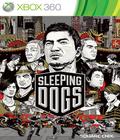Sleeping Dogs doesn't break new ground. It's actually quite happy with the ground it's on, choosing instead to rely on storytelling and the mythos of Asian criminality (especially to the kind of people whose knowledge of such things is limited to movies) to draw in anyone who plays it.
The Asian underworld has always been an enticing and popular canvas for entertainment, whether it's been in the form of wild gunfests starring the likes of Chow Yun-Fat or Beat Takeshi or morose, subdued dramas designed to add dimensions and educate viewers on the traditionally laced — and still mystical — workings of groups of individuals with cool cars, shades, tattoos and a lot of history behind them.
Sleeping Dogs lies somewhere in the middle, taking itself seriously enough to invest plenty of time in its characters and dialogue while also making sure plenty of blood flows. Let's face it, no game with either Chinese or Japanese gangsters can go too long without a group of them eventually screaming and trying to shoot or kick each other in the face.
Wei Shen, the game's hero, is charged with making sense of the chaos as an undercover cop sent in to investigate the Sun On Yee, the largest fictional faction of Triads in Hong Kong. It's through Wei's eyes where we start to see how United Front did some of its homework as far as its depiction of Chinese criminal circles.
Those who've chosen to research anything on the subject will notice that the "Sun On Yee" is a not-so-subtle reference to the Sun Yee On, the real-life Triad gang. In the game, the Sun On Yee's bitter enemies are 18K, which is just a few numbers up from the real-life 14K. United Front also tosses out terminology most can assume is unique to Triad hierarchy — lieutenants are known as "red poles" and the leader of the crime family is known as a "dragon head." Even the names of some of the red poles seem to follow a certain kind of Asian lingual gangsterism with monikers like Broken Nose Jiang, Dogeyes or Big Smile Lee.
United Front seems to balance out this infusion of new criminal culture by molding its characters out of recognizable archetypes. Wei (voiced excellently by Will Yun Lee) is the classic ass-kicking hothead, determined to see his mission to the end. His handlers are stick-in-the-mud types who say things along the lines of, "You're in too deep!" or "You're making a mistake!" Even the criminal personalities will feel familiar. The dragon head of Sun On Yee is Uncle Po (James Hong), who blankets the room with his grandfatherly (or godfatherly) energy, while Big Smile Lee (Tzi Ma) is your typical insidious powermonger warding off the likes of Jiang, the brainy, analytical "aunt" of the Sun On Yee.
All of these characters inhabit an interpretation of Hong Kong that is alive with detail and culture, the kind of place worth exploring in any setting, especially an open-world game. That kind of environmental allure was a draw of Sleeping Dogs' distant forebears, the True Crime series of games, which focused on replicating real-life cities and placing them before the player. Sleeping Dogs was originally supposed to be another True Crime installment, but Activision squashed the project until Square Enix picked it up and repackaged it in its current form and name. It ended up being for the best.
I'm not going to outline absolutely everything Wei can do in the game's world with great detail because there's a fairly good chance you've already done it in other open-world titles. United Front follows the open-world playbook closely, offering Wei a set list of story-related missions that range from beating up a few thugs for the Sun On Yee to bugging the apartment of a Chinese pop superstar to a full-on armed assault against your enemies. There are plenty of side missions with a by-the-book Chinese detective, along with street races and ancillary missions (or favors) to help various people around the city. Some of them are off the wall, such as one man wanting you to free-run while he tapes you.
That's not to say the world is boring. Hong Kong offers plenty of cultural nuggets, such as heading to the club to sing some karaoke or walking through a marketplace that's teeming with the noise of people pitching Wei their wares. You can get pork buns from a food stand or "massages" from one of numerous parlors around town. Stopping by at prayer shrines can increase your health, while checking in to the local martial arts fight club can help sharpen your fighting skills.
Action is where Sleeping Dogs attempts to makes its mark, investing a lot into hand-to-hand combat. Every altercation morphs the experience into a relatively intricate beat-'em-up, with blocking, combinations, countering and grappling. The X and Y buttons handle the striking and countering while B handles grappling. Holding down the X button at certain moments can lead to throws or instances where you can "break" the opponent's leg or arm. I say "break" in quotes because, well, the same dude whose arm you just mangled can still block and punch you with the rest of his buddies.
The countering system will remind players of the newest Batman games, where enemies glow a certain color before striking, offering up a visual cue for the player to act. It's especially effective against people with melee weapons, which can instantly put momentum on your side if you get your hands on one. The system takes some adjusting for those used to fighting in Yakuza, which carried a faster pace and was more open to letting players blow away everyone with kicks and punches. Fight like that in Sleeping Dogs, and you will die. It's that simple. However, I managed to beat down masses of enemies simply by grabbing on to them and mangling them with tosses and punches as best I could before disposing of them. Apparently, judo and jiujitsu philosophies are completely alien to the fictional criminal denizens of Hong Kong.
The most entertaining aspect of hand-to-hand combat is the environmental kills, which can be extremely brutal. These can be achieved by, again, grabbing on to an opponent, pulling him to a glowing object and pressing one of the face buttons. Some of them are simple, such as tossing someone into a dumpster. Others are grisly, such as mashing someone's face onto a stove or a buzzsaw, or hanging them on a big fishhook. Doing all of these things can fill up your "face" meter, which can automatically refill health and make everyone a bit easier to fight (they start backing away from you in fear) when it's full.
But when guns come into the equation, the game loses some of its luster. It's an extremely minimalist aim-and-shoot system with some cover elements (just push one of the shoulder buttons), with enemies all too eager to feed themselves to your pistol or assault rifle. You can zoom with the left trigger and fire with the right. There's even some "bullet time" mechanics thrown in there for good measure, as it activates when Wei vaults over his cover. Anyone who's played Max Payne 3 will be able to dominate any gunfight — a little too easily — in Sleeping Dogs.
There's some creative agility to Wei's abilities other than shooting and fighting. He can also hack into computers with his phone, which enacts a nifty number-guessing minigame. He can also pick locks and break into safes with some interesting uses for the left and right thumbsticks. Some missions require him to do a lot of these things under the pressure of time, which can offer a decent break from kicking and shooting hordes of foes.
Another intriguing feature about the game is leveling up your abilities. This generally happens with the progression through story and alternative missions, with players earning "police" and "Triad" experience. The police stuff focuses a lot on guns and vehicles, while the Triad experience can bolster your fighting abilities. Fighting gets a little extra love from the discovery of lost jade statues around the city. If Wei returns these to the kung-fu school, he gets to learn a new technique in return.
While I enjoyed a lot of the Hong Kong splendor, I was distracted by bits of choppy animation and some bland-looking visuals in cut scenes. Character faces seem to lack the detail we've come to expect in other games (most notably offerings from Rockstar). While I generally enjoyed driving around the city, racing and pursuit missions had a tendency to dissolve into vehicular slugfests. Pressing the thumbstick in a direction and hitting the right shoulder button makes your car charge in a specific direction, so you can bash cars out of the way. This was useful (and welcome) during annoying jaunts away from the cops, but the racing aspect of the game seemed to lose some of its art to me. There's a distracting feel of a lack of polish in the entire package, but it wasn't enough to keep me away from finishing the story, which by comparison other open-world contemporaries, felt short and wrapped up a little too quickly. I'd have liked to have undergone more missions with the different red poles and seen more development in their roles within the Triad hierarchy. I even thought Wei would meet leadership of 18K and end up having to run some missions for them. Perhaps it'll happen in the next one.
From an artistic and technical standpoint, Sleeping Dogs is not a marvel, but it is perhaps my favorite summertime game. It's a game that fuses together some of the best parts of other open-world titles and then mixes in Hong Kong Triads. In many ways, that's all I wanted.
Score: 7.8/10
More articles about Sleeping Dogs











 Sleeping Dogs follows the story of detective Wei Shen as he infiltrates one of Hong Kong's notorious Triad crime syndicates. As a newly hired thug within the Triad organization, Wei must do whatever it takes to stay undetected and survive, balancing his moral duty as a cop with the objectives of the assignment.
Sleeping Dogs follows the story of detective Wei Shen as he infiltrates one of Hong Kong's notorious Triad crime syndicates. As a newly hired thug within the Triad organization, Wei must do whatever it takes to stay undetected and survive, balancing his moral duty as a cop with the objectives of the assignment.








































